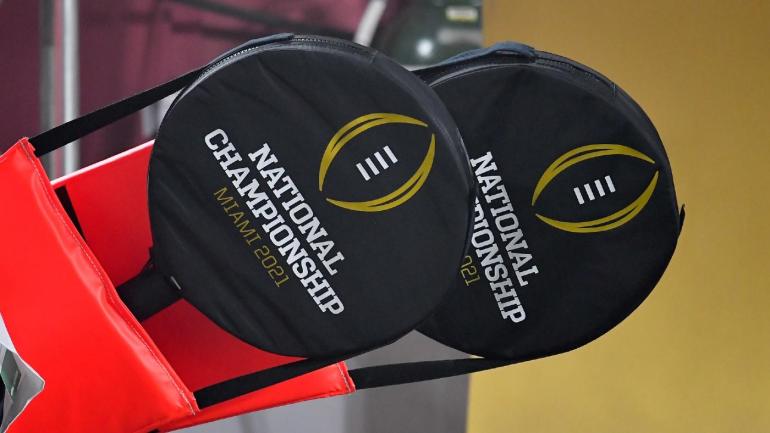
College Football Playoff expansion is not only delayed, the CFP Board of Managers -- those necessary to vote on adopting a 12-team playoff -- will not even fly to Chicago for a previously scheduled meeting on Sept. 28. CFP director Bill Hancock told CBS Sports late Tuesday that there was a "50-50" chance that the meeting would not take place in person.
The differences are so vast among stakeholders at this point that the possibility of getting a unanimous vote from the board -- university presidents and chancellors -- next Tuesday seemed like a longshot, sources told CBS Sports. Though there will not be a vote and the board will not travel to Chicago, it will meet for an informational session on Zoom.
While a source involved in the process tells CBS Sports that "good progress" was made Wednesday in Dallas at a meeting of the CFP Management Committee -- 10 FBS commissioners and Notre Dame athletic director Jack Swarbrick -- it was not good enough to move forward with expansion plans at this juncture.
The committee was in position to formally recommend expansion for next week's meeting. However, a call among members of the committee held last week produced what was termed an airing of the grievances.
Though the board will no longer meet in person and a vote will not be executed, the committee will hold its regularly scheduled meeting in Chicago to continue its discussions, Hancock said in a statement Wednesday.
During this week's meeting, an eight-team playoff model was discussed, though "there was not [much support] for it among the committee, Hancock told CBS Sports.
CBS Sports reported earlier this month that CFP expansion was unlikely to be approved at next week's meeting, one that was originally thought to be scheduled as a means of rubber stamping an expanded 12-team playoff field.
What has become clearer in recent days is why. The issues have become familiar.
Media rights
ESPN has five years left on its original 12-year, $7.2 billion CFP deal. The overwhelming preference among the commissioners is to maximize their profit in expansion by getting multiple partners into the bidding.
There is significant support to allow the remaining five years to run out and put the expanded playoff out to bid. Allowing multiple partners to bid on the expanded postseason would resemble the models used by the NFL, MLB, NBA and NHL.
Among the other options is offering ESPN the opportunity to buy additional playoff games within the 12-year term at an above-market rate, sources tell CBS Sports. That "buy" would be an increase from seven games in the current deal -- three playoff games and four New Year's Six games -- to 11 games in a 12-team playoff. The soonest an expanded CFP could start is 2023.
The CFP could also tell ESPN it may only get half the rights, thereby allowing multiple partners to bid on the other half.
Player safety
Specific, significant issues have come to light. One high-ranking source tells CBS Sports that commissioners have yet to do their due diligence regarding student-athlete welfare when it comes to playing what could be a record 17-game season. Medical personnel has not been engaged properly to assess a team that would be playing two consecutive months without a break if it had an early-season bye week.
As proposed, first-round play-in games would be held a week after conference championship games. However, the chances of playing a 17-game season for any team in a 12-team playoff is remote.
Academics
Playing football during finals in the month of December has been a concern since the BCS started in 1998. An expanded CFP would add more games. Athletes could be on the road for a possible four games in the playoffs.
Winterization
There's potential problems with scheduling playoff games at on-campus stadiums for those in the North and Midwest. Concerns include pipes freezing within bathroom sand irrigation systems. One source says the expense in winterizing such stadiums is $10 million to $12 million per stadium, and the process would take two years to complete.
That problem could solved by conferences declaring a central location within the conference footprint for play-in games. Examples: SoFi Stadium in Los Angeles for the Pac-12, Lucas Oil Stadium in Indianapolis for the Big Ten and Mercedes-Benz Stadium in Atlanta for the SEC.
Winterization is less of a concern than the others. The NHL has played five Winter Classic games in January at college stadiums.
The Rose Bowl
Patience seems to have run out on allowing the Granddaddy of 'em All access to its traditional partners (Big Ten, Pac-12) at its traditional time (Jan. 1 at 5 p.m. ET). In an expanded playoff, the games themselves are seen to be more important than the locations at which they are played.
It seems the Rose Bowl will either be part of the expanded playoff -- placed in the bracket at the whim of the stakeholders -- or be played outside the CFP.
As proposed, the expanded playoff would include the top six ranked conference champions followed by six at-large teams determined by the CFP Rankings. The four highest-ranked conference champions would receive first-round byes.
It was thought that the 12-team proposal leveled the playing field. The Pac-12 would have increased access. In most years, it would almost certainly have its champion ranked in the top six. Notre Dame would have its best access ever, only needing to finish in or around the top 12 to get a bid. The top-ranked Group of Five champion would basically be guaranteed a spot with the potential for other Group of Five teams to get into the field as well.
![[object Object] Logo](https://sportshub.cbsistatic.com/i/2020/04/22/e9ceb731-8b3f-4c60-98fe-090ab66a2997/screen-shot-2020-04-22-at-11-04-56-am.png)

















